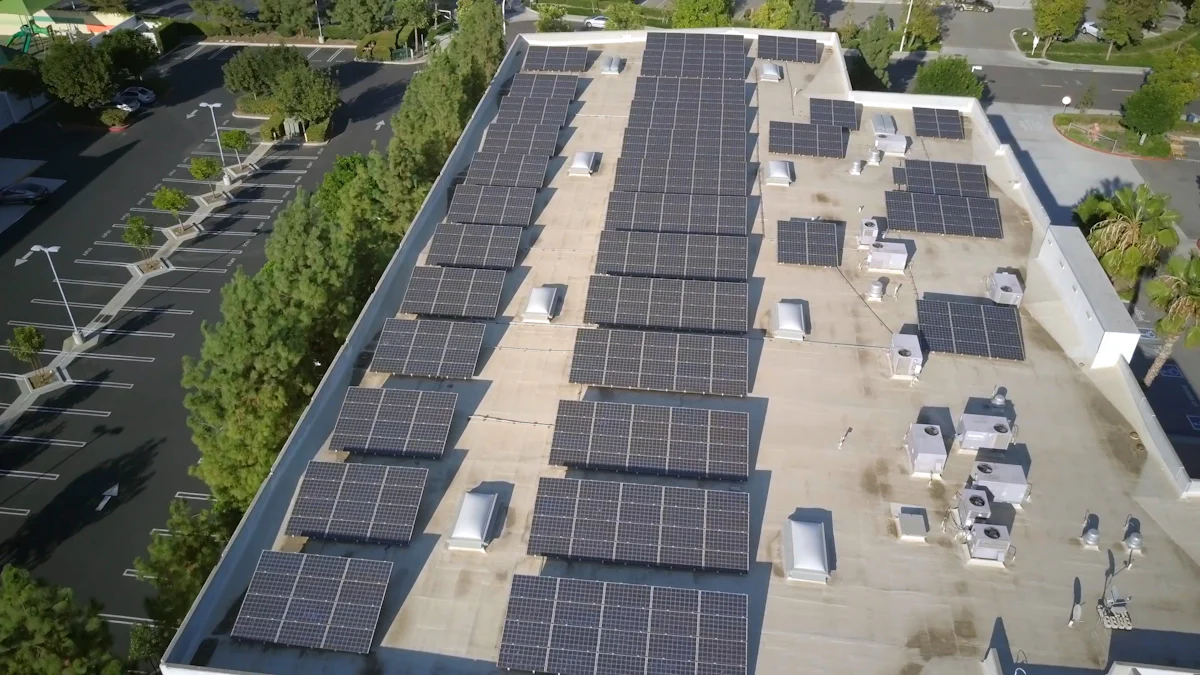Steps JUSDA Takes to Achieve Green Logistics

JUSDA, a profesional player in the logistics industry, exemplifies a steadfast dedication to green logistics. Their commitment extends beyond mere compliance, deeply ingrained in every operational facet. By prioritizing sustainable practices, JUSDA actively reduces carbon emissions and minimizes its ecological footprint. The company's ethos revolves around efficient waste management strategies that focus on minimizing landfill waste and promoting recycling initiatives. Looking ahead, JUSDA aims to enhance eco-friendly practices by exploring renewable energy sources and green technologies.
Understanding Green Logistics

Definition and Importance
Green Logistics: The practice of integrating environmental sustainability into supply chain management, ensuring efficient and eco-friendly transportation processes.
Importance of Green Logistics: Highlighting the significance of reducing carbon emissions, minimizing waste, and promoting sustainable practices in the logistics industry.
What is Green Logistics?
Green logistics encompasses a holistic approach to supply chain operations, emphasizing the reduction of environmental impact through optimized transportation routes and energy-efficient practices.
Why Green Logistics Matters
The adoption of green logistics is crucial for mitigating climate change effects by lowering greenhouse gas emissions, conserving natural resources, and fostering a more sustainable future for generations to come.
Environmental Impact of Traditional Logistics
Carbon Footprint
Traditional logistics operations often contribute significantly to carbon emissions due to inefficient transportation methods and reliance on fossil fuels. Implementing green logistics strategies can effectively reduce this carbon footprint.
Resource Consumption
The conventional logistics model involves high resource consumption levels, leading to increased waste generation and environmental degradation. By transitioning to green logistics practices, companies can minimize resource depletion and promote a circular economy approach.
JUSDA's Green Logistics Strategies
Green Channel of Customs
To streamline customs clearance effectively, JUSDA implements advanced technologies that expedite the process and reduce waiting times for shipments. By embracing digital documentation practices, the company minimizes paperwork, enhancing operational efficiency and reducing environmental impact.
Customized Trains (Domestic & International)
Benefiting from rail transportation's lower CO2 emissions compared to other modes, JUSDA leverages tailored train services for both domestic and international cargo movements. This strategic choice not only reduces greenhouse gas emissions but also optimizes supply chain operations for sustainable outcomes.
Last Mile Delivery Optimization
By incorporating electric vehicles and low-emission delivery modes into their fleet, JUSDA ensures that the final leg of the delivery journey is environmentally friendly. This approach aligns with the company's commitment to reducing carbon footprint while maintaining efficient logistics solutions.
Energy Conservation and Emission Reduction
Warehouse Management
Implementing efficient warehouse management practices is crucial for reducing energy consumption and minimizing emissions.
By optimizing storage spaces and inventory handling, JUSDA can enhance operational efficiency while promoting sustainability.
Utilizing advanced technologies in warehouse operations allows for real-time monitoring of inventory levels and facilitates timely order fulfillment.
Fleet Optimization
Fleet optimization plays a significant role in reducing fuel consumption and lowering emissions in transportation activities.
JUSDA strategically plans routes, schedules maintenance checks, and monitors vehicle performance to ensure optimal fleet efficiency.
By adopting data-driven approaches to fleet management, the company can minimize empty miles and enhance overall transportation sustainability.
Route Planning
Strategic route planning is essential for minimizing fuel usage and emissions during transportation operations.
Through the integration of intelligent routing software, JUSDA can identify the most fuel-efficient paths for deliveries.
Prioritizing eco-friendly routes not only reduces environmental impact but also contributes to cost savings and operational effectiveness.
Green Transportation Solutions
Transporting Energy-efficient Products
Transporting energy-efficient products aligns with JUSDA's commitment to promoting sustainable supply chain practices.
The company prioritizes the shipment of goods that adhere to energy efficiency standards, contributing to reduced carbon footprint.
By specializing in the transportation of environmentally friendly products, JUSDA supports green initiatives across various industries.
Specialized Services
Offering specialized logistics services tailored to eco-friendly product requirements showcases JUSDA's dedication to sustainable solutions.
The company provides customized handling procedures for delicate or environmentally sensitive cargo, ensuring proper care throughout the supply chain journey.
By integrating specialized services into their offerings, JUSDA enhances customer satisfaction while upholding environmental responsibility.
Compliance Consultancy
Adherence to Environmental Standards
Ensuring compliance with stringent environmental regulations is a top priority for JUSDA's logistics operations.
The company maintains a proactive approach to staying updated on evolving environmental standards and implements necessary measures accordingly.
By adhering to global environmental guidelines, JUSDA demonstrates its commitment to responsible business practices.
Guiding Clients Towards Sustainability
As a trusted partner in sustainable logistics, JUSDA offers consultancy services aimed at guiding clients towards greener supply chain practices.
Through educational programs and tailored recommendations, the company empowers clients to make informed decisions that prioritize sustainability.
Collaborating with clients on sustainability initiatives fosters long-term relationships built on shared environmental values.
Intelligent System Platform
JusLink Smart Supply Chain Management
JUSDA implements the JusLink Smart Supply Chain Management platform to optimize logistics operations. This innovative system integrates real-time data and analytics, enabling efficient production scheduling and streamlined transportation routes. By leveraging this intelligent platform, JUSDA enhances supply chain visibility and responsiveness, ensuring timely deliveries and cost-effective solutions.
Data Analytics for Optimization
Data analytics play a pivotal role in JUSDA's quest for operational excellence. Through advanced data analysis techniques, the company gains valuable insights into transportation patterns, inventory management, and customer demand forecasting. By harnessing the power of data analytics, JUSDA can identify optimization opportunities, reduce inefficiencies, and enhance overall supply chain performance.
Future Trends in Green Logistics

Emerging Technologies
AI and Machine Learning in Logistics
Incorporating AI and machine learning technologies revolutionizes logistics operations, enhancing efficiency and accuracy. These advanced systems analyze vast datasets to optimize routes, reduce delays, and improve resource utilization. By leveraging AI-driven solutions, companies streamline processes, minimize errors, and adapt to dynamic market demands.
Renewable Energy Sources
The integration of renewable energy sources marks a significant shift towards sustainable logistics practices. Embracing solar, wind, and other renewable energy options reduces reliance on fossil fuels, decreasing carbon emissions throughout the supply chain. By investing in renewable energy infrastructure, organizations pave the way for greener transportation solutions that align with environmental conservation efforts.
Policy and Regulatory Changes
Government Initiatives
Government initiatives play a pivotal role in shaping the future of green logistics. Through regulatory frameworks and incentives, authorities encourage businesses to adopt eco-friendly practices and comply with stringent environmental standards. Collaborative efforts between governments and industry stakeholders drive innovation in sustainable transportation methods while fostering a culture of environmental responsibility.
Industry Standards and Compliance
Adherence to industry standards and compliance regulations is paramount for sustainable logistics development. By following established guidelines and best practices, companies ensure transparency, accountability, and ethical conduct in their operations. Embracing industry standards not only enhances credibility but also demonstrates a commitment to responsible business practices that prioritize environmental stewardship.
Recapping JUSDA's proactive strides in embracing green logistics, the company's commitment to sustainable practices shines through its innovative strategies. The long-term advantages of prioritizing eco-friendly solutions extend beyond reduced emissions, fostering a greener future for all. Encouraging the logistics industry to follow suit and adopt green practices is paramount for global sustainability efforts. As we envision the future of logistics, integrating renewable energy sources and cutting-edge technologies will pave the way for a more environmentally conscious supply chain landscape.
See Also
Effective Ways to Enhance Automotive Supply Chain Performance | JUSDA Insights
Key Approaches for Advanced Manufacturing with JUSDA's Supply Chain Solutions
Success Story: JUSDA's Warehouse Automation Achievement
Exploring the Impact of IoT on Contemporary Logistics
In-Depth Overview of IoT Supply Chain Solutions and Advantages
